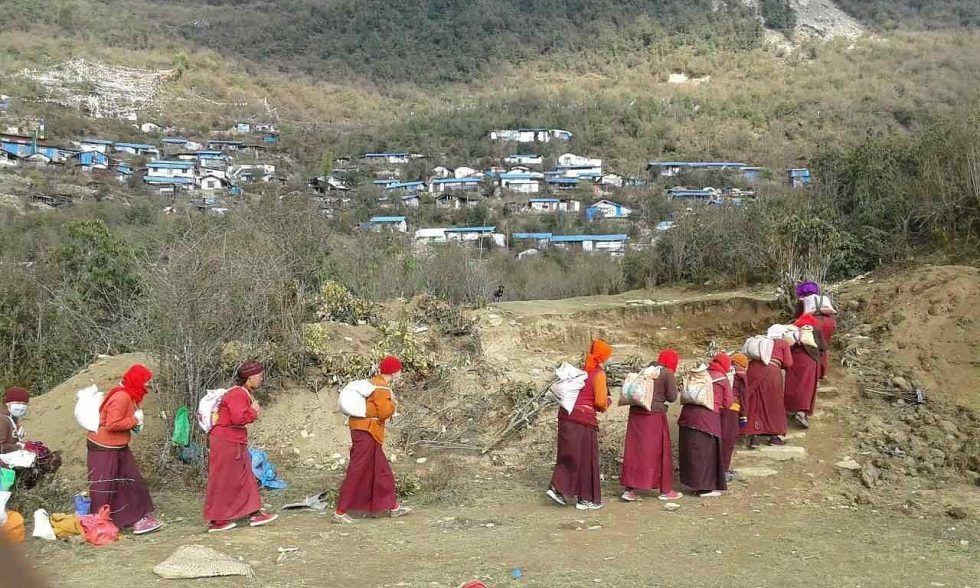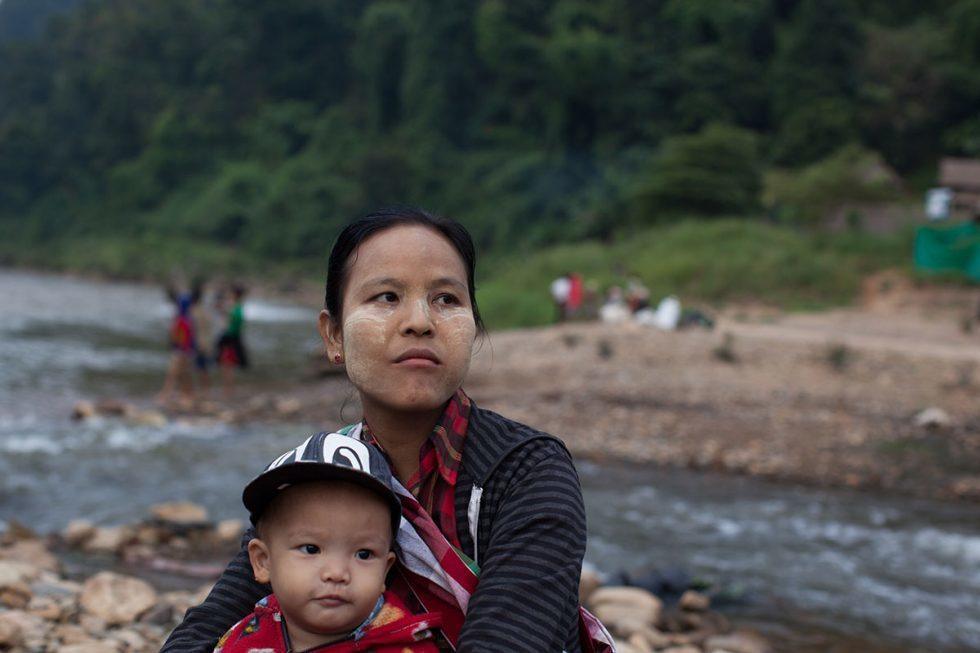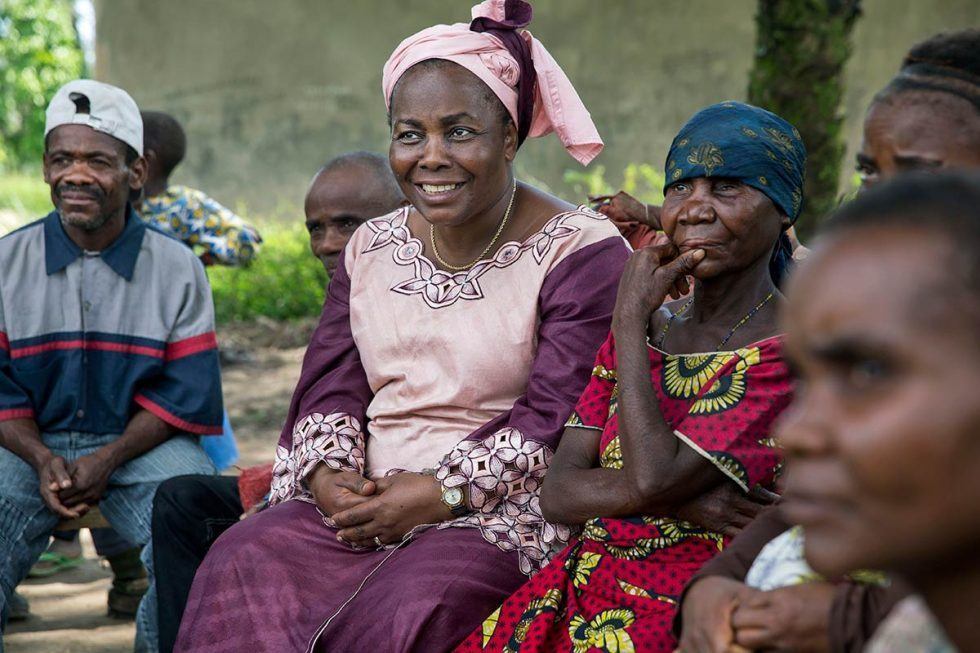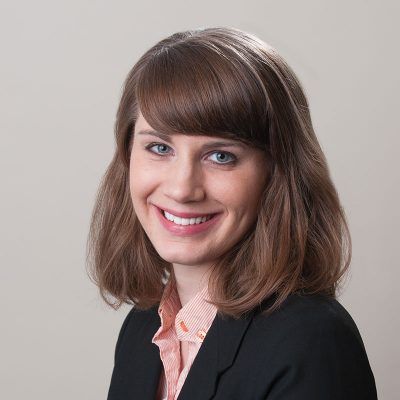The world has watched in horror as massive numbers of migrants and refugees from the Middle East and Africa have embarked on treacherous journeys across the Mediterranean Sea to Europe, compelled by wars, persecution, poverty and human rights abuses at home. Thousands have drowned. Still others face trafficking and abuse—both at sea and when they cross borders—and tens of thousands have been stranded in Greece as European countries refuse to accept them.
On this World Refugee Day, the international spotlight, rightly, shines on this vast crisis—and American Jewish World Service stands in solidarity with human rights organizations working in Europe to mitigate the devastation.
But we also hope the world will remember the scores of people from other parts of the globe forced to flee their homes to escape armed conflict, gang warfare, natural disasters, climate change, economic insecurity, and religious and ethnic hatred. Examining these crises, we see that while the fear and uncertainty of displacement is universal, the particulars are not: Not all migrants1 travel by boat or end up in tents, and not all who migrate in search of safety are granted the status of “refugee”—which enables them to access critical rights, protection and services in another country.
The international human rights community tries to safeguard the rights of all displaced people—from refugees2 to internally displaced persons (IDPs)3 to stateless people4 to asylum seekers5 —even when their countries of origin strip their rights. AJWS supports human rights organizations that address the root causes of migration and help displaced people restart their lives.
Here are five less-publicized crises unfolding and persisting throughout the world:
- Senegal: The highest number of West Africans to migrate to Europe last year came from Senegal, a country viewed as a model of peace and stability, but where a complex combination of poverty, poor job prospects and high job insecurity, climate change and political conflict have forced young people to leave in droves in search of better opportunities.Meanwhile, a protracted conflict afflicting the Casamance region for more than 30 years continues to affect the country, collectively killing thousands, littering the land with mines and displacing tens of thousands of people to other countries or elsewhere in Senegal. Most of these internally-displaced people have sought refuge with family, friends and host communities that often become extremely stretched. Today, Senegalese communities with few resources struggle to reabsorb those who fled the war—but AJWS grantees are coming to their aid, helping returned residents restore their livelihoods and rebuild destroyed houses, schools and healthcare centers.
Construire la Paix par le Developpement Economique et Social (COPI) is giving families farm animals to milk, eat and sell, and helping residents regrow communal market gardens, recover salt flats and build small scale hydraulic works. The Association d’Appui aux Initiatives de Paix et de Développement (ASAPID) negotiated with a rebel faction to allow displaced people to return home and teachers to resume working in abandoned schools. It is also mediating community disputes, handing out seed to farmers and giving cheap credit to business owners to help jumpstart the local economy. To encourage peace and a return to normalcy, the Comité d’action pour le Développement de la zone de Palmier (CADP) is resurrecting traditional Senegalese social events that had ceased during the war—like dances and wrestling matches—in 23 villages.
- Nepal: The story of the Tibetan people has moved the international community for decades—ever since the Chinese government’s 1959 occupation of the region sent tens of thousands of Tibetans fleeing across the Himalaya to India, Nepal and Bhutan to follow their exiled spiritual leader, the Dalai Lama. Nepal is still home to Tibetan refugees today, but the country has failed to grant many of them any form of documentation or refugee status, which would give them access to basic services and the right to live and work there.When massive earthquakes devastated Nepal last year, Tibetan refugees were among several vulnerable populations to be overlooked by the government. Sengedag Service Society (SSS), an organization supported by AJWS, has been helping Tibetan Buddhist nuns and monks whose remote mountaintop homes were destroyed. The group built a road so aid could reach the community, transported injured survivors to hospitals, and helped with food and temporary shelter. They’re also building earthquake-resilient homes so that Tibetan men and women can return and resume their lives.

- Burma: For decades, poverty and persecution by a military regime in Burma have sent hundreds of thousands of ethnic minorities and activists fleeing across the Thai, Indian, and Chinese borders, into hiding within Burma’s forests or to other countries. Although some are now returning, droves are still displaced and more than 1 million Rohingya people in Burma are not recognized as official citizens by their government. AJWS funds dozens of groups along the borders and inside the country that are advocating for the rights of refugees and IDPS and ensuring them access to essential services.AJWS grantee Women’s Peace Network-Arakan (WPNA) seeks equality for the Rohingya Muslim community, hundreds of thousands of whom have been persecuted, killed and displaced by the government. AJWS has called on U.S. leaders to demand an end to the Burmese government’s systematic abuse of the minority, which they refuse to even recognize by name. When thousands of Rohingya refugees from Burma were imperiled at sea this year while trying to escape internment camps, AJWS also pleaded for the U.S. to help with a search and rescue operation and pressure Thailand to allow boats to dock on its shores. It did—at least for a temporary term.
Another organization supported by AJWS, Karen Environmental and Social Action Network (KESAN), trains displaced minority communities in Burma’s Karen State to learn sustainable trades, defend their land and natural resources and participate in political processes. Women’s groups in Kachin and Shan states—where fighting has displaced more than 150,000 people since 2011—document human rights abuses, educate internally-displaced women about public health and provide basic health services like oral rehydration salts, HIV counseling and testing and first aid.
In these northern states, IDPs face extrajudicial torture, killings and rapes, continual withdrawals of humanitarian aid and destruction or occupation of their villages. Kachin Women’s Association Thailand (KWAT) counsels people traumatized by their ordeal, trains community leaders and operates crisis centers for women who have experienced violence or trafficking. Ta’ang Women’s Organization (TWO) and Ta’ang Student and Youth Organization (TSYO) have set up mobile health care clinics and 26 schools, advocating to have them recognized by the government.

- Democratic Republic of Congo: There are millions of IDPs in the DRC—many who fled the terror, rape and other atrocities of the various long-term wars in the eastern region and many who escaped violent conflicts over DRC’s valuable land and mineral resources. Throughout these conflicts, army and rebel groups have raped and sexually enslaved women—leaving countless women traumatized, pregnant, infected with HIV or ostracized and evicted by their families.With support from AJWS, an organization called Female Solidarity for Integrated Peace and Development (SOFEPADI) helps survivors of sexual violence navigate the judicial system and bring perpetrators of rape and sexual assault to national and international courts—and raises international awareness of the plight of eastern Congolese women. It operates a medical clinic to provide emergency care and reproductive services to the internally-displaced and has recently provided food, shelter, agricultural resources, educational materials and psychosocial support to 300 families displaced by renewed fighting in eastern Congo. SOFEPADI also provides opportunities for women to earn a living and cover their children’s school fees.
Two others grantees, Aide et Action pour la Paix (AAP) and Collectif des Associations Féminines pour la Paix et le Développement Intégral (CAFPDI), help IDPs recover their land rights in Masisi and Ruthsuru territories.

- Uganda: After the passage of the Ugandan Anti-Homosexuality Act in late 2013, Ugandan LGBT people faced an increase in evictions, violent attacks and public outings, worsening what was already a dangerous environment for the vulnerable population. While some LGBT rights activists had sought asylum in various countries before, the increase in insecurity led to an uptick in such forced migration, namely to Kenya. Even after the Ugandan law was nullified in 2014, LGBT border crossings continued—hundreds have now sought refuge in Kenya—because of persisting persecution.In Kenya, where LGBT people are also fighting high levels of discrimination, harassment and violence, these refugees and asylum seekers have struggled to find work and adequate healthcare—and have become targets of violence. An organization supported by AJWS* is addressing all of these challenges and advocating on the individuals’ behalf to the United Nations High Commissioner for Refugees and its partners to ensure that it guarantees their safety and provides them the aid and relief they need. AJWS’s grantee has helped many LGBT refugees start their own businesses, like restaurants and shops; and has helped them access LGBT-friendly health service providers who won’t refuse to treat them or ridicule them because of their sexual orientation.
The organization also runs a “transitional house” for LGBT refugees and asylum seekers who recently crossed the border. The house offers emergency supplies and basic services, teaches refugees and asylum seekers how to navigate their new lives, provides a safe space from violence, and provides psychological counseling and support for their traumas. And it works with local police, religious leaders and other community stakeholders to push for an end to hateful discrimination and greater respect for the human rights of LGBT people.
AJWS is hopeful for the future of the world’s forcibly displaced people—thanks to the brave activism and relief efforts of grassroots organizations like the ones we support. We are determined to defend the human rights of forcibly displaced people and ensure that they rebuild their lives in safety, peace and dignity. Join us in raising awareness about all of the world’s refugees and displaced people.
*For security reasons, AJWS is not disclosing the names of some organizations we support.
1 Migrants are people who choose to move mainly to improve their lives by finding work or education or for other reasons.
2 Refugees are people who flee their country of origin because of conflict or persecution because of race, religion, nationality, political opinion or members in a particular social group. They are protected by international law, but some states do not recognize them.
3 Internally displaced persons are people who flee conflict, persecution or natural disasters but have not crossed a border to find safety.
4 Stateless people are those whose countries do not recognize them as nationals. They do not have citizenship—and thus struggle to access basic rights like education, healthcare and employment. They often can’t open a bank account, buy a house or even get married.
5 Asylum seekers are people who flee their country but have not yet achieved legal status as refugees.
AJWS’s work in countries and communities changes over time, responding to the evolving needs of partner organizations and the people they serve. To learn where AJWS is supporting activists and social justice movements today, please see Where We Work.

